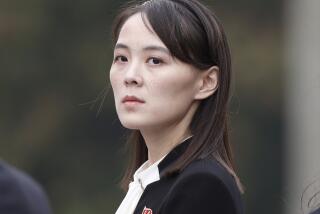Propagandists tell North Koreans that supreme leader’s son is a successor in the making
- Share via
Reporting from Washington — In a region where Confucian thinking about seniority still holds sway, where political life generally begins at 50, it isn’t easy to sell the public on a twentysomething who has never held a real job.
So North Korean propagandists are hard at work spinning Kim Jong Eun’s youth into an asset, trying to convince a wary public that the youngest son of leader Kim Jong Il will bring the country lurching toward modernity.
The ruling Workers’ Party is convening a rare congress on Tuesday in Pyongyang to name the next generation of leadership. There are widespread expectations that the young Kim, who is either 27 or 28, will be be named to a position in the Politburo that will pave the way for his rise to power after the death of his father, 68 and in poor health.
Although Kim Jong Eun’s name is never mentioned in the official press, North Koreans have been hearing about him for one year at mandatory ideological lectures conducted by the Workers’ Party, according to North Koreans.
“People believe he will be smarter and will bring the country new perspectives,” said a North Korean woman in her early 50s from Hamhung, who gave her name as Jeong Hee Ok.
Interviewed earlier this year in China, where she was working as a housekeeper, she said she first heard Kim Jong Eun’s name late last year at her training session. “They told us all about the successor, and we were very happy. Nobody worries back home that he is too young, unlike here in China, where he is perceived as too inexperienced.”
The account is corroborated by excerpts from a propaganda lecture that were obtained by North Korean Intellectual Solidarity, a Seoul-based group of elite defectors.
“For the 21st century, we need a leader who is young and vibrant and full of spirit. … The party happens to have a young leader in mind who possesses those kinds of qualities,” states the lecture, which was said to be delivered to military cadres around North Korea beginning in October of last year.
The lectures provide some of the few clues to how North Korea intends to catapult onto the world stage a figure so unknown that people are not even sure what his name is – alternately said to be Kim Jong Eun or Kim Jong Un (the two are not the same in Korean). References in the official press teasingly mention the “Young General.”
Similarly, in the years before 1980, when Kim Jong Il was being groomed to succeed North Korean founder Kim Il Sung, he was referred to not by name but as the “party center.’’Another North Korean living in China said she heard Kim Jong Eun had been living under cover for years in preparation for becoming leader.
“They say he was three years in the military in the toughest region of the country. He lived like everybody else; they didn’t have much food. He saw the system from the inside and will help fix it,” said Su Jong, 28, who comes from the outskirts of Pyongyang and left late last year. “I heard this from the wives of soldiers.”
Open Radio for North Korea, another Seoul-based group, also reports that Kim Jong Eun spent three years in the North Korean military as a soldier, not an officer, and that he is now working in the political affairs unit of the military. He is also reported to have obtained two degrees in Pyongyang, one from the Kim Il Sung military academy and another in physics from Kim Il Sung university. He attended high school in the Swiss capital of Bern, where he was living under an assumed name, pretending to be the son of a North Korean embassy official.
At the Workers’ Party meeting Tuesday, an appointment of Kim Jong Eun to the ruling Politburo or to the central party’s military would place him on the same career path by which his father was groomed in the 1980s.
The party’s congress, originally scheduled for early September, was delayed without explanation, with some analysts suggesting Kim Jong Il’s health was too delicate and others citing flooding that prevented delegates from reaching Pyongyang. Kim Jong Il also may have hesitated because of criticism from the international community and from inside his own country to the succession.
“Five years ago, or even two years ago, people in North Korea would have believed whatever they were told about Kim Jong Eun, but now the economic situation inside North Korea is so dire,” said Kim Heung Gwang, a former university professor who heads the Seoul-based North Korean Intellectuals Solidarity.
A Spaniard who is a frequent spokesman for the North Korean regime denied in recent days that the naming of a successor was imminent.
“How foolish it would be to vote or appoint a person as a leader of a country that is a complete stranger,” said Alejandro Cao de Benos, special representative for the North’s Committee for Cultural Relations With Foreign Countries, in an interview Thursday with Agence France-Presse.
Former U.S. President Jimmy Carter wrote earlier this month on the website of the Carter Center that Chinese Premier Wen Jiabao told him that Kim Jong Il had personally denied reports of the young man’s pending appointment as successor, calling it “a false rumor from the West.”
Ethan S. Kim of The Times’ Seoul bureau contributed to this report.
More to Read
Sign up for Essential California
The most important California stories and recommendations in your inbox every morning.
You may occasionally receive promotional content from the Los Angeles Times.










